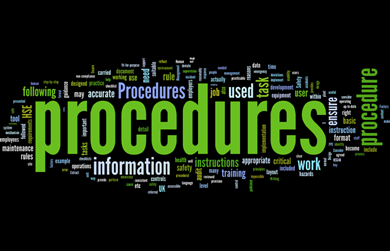With safety management now well entrenched in the maritime industry, the last industry to come onboard with it, we still come across people who ask what do we need this for? We’ve been doing this for years without it!

A big part of safety management is procedures, both operational and emergency which are vital to ensure safe operations and being able to deal with onboard emergencies safely and efficiently.
..are what you do in your day to day work but usually include some that may not be used so often but form a major part of operations. They should be written in an easy-to-follow format and identify a who is responsible for each step.
..provide what to do in the event of an emergency situation such as a fire in the engine room or other areas of the vessel, person overboard, collision, etc. It’s critical that all crew members know and understand their duties in emergencies to protect not only their lives but the lives of all others onboard!
During our induction and training sessions we hear “yeah we’ve got procedures, but I haven’t had time to read them or I know all that stuff.” Well, that’s really good but when WE do drills, they often stand there looking silly waiting for someone to tell them what they should already know.
This is why procedures are IMPORTANT but it’s no use having them if crew members don’t or can’t be bothered reading them.
While many operational procedures can and often are taught while on the job emergency procedures cannot!
The importance of emergency procedures cannot be understated as they are the ones that ensure the safety of the vessel and all those onboard. By not knowing them you place your life and the lives of others at risk.
How would you feel if you didn’t know what to do in a fire in the accommodation where your best mate was sleeping, and he ended up dying in that fire? That’s why procedures are important.
Hopefully now you’re seeing why procedures are important but having procedures alone is not enough! You need to practice which means doing regular drills as doing these builds muscle memory so when an emergency situation occurs you don’t have to think about what you should be doing, you are already doing it!
More on drills next week!
Number one recommendation is to go through your procedures or if you don’t have them, get to work developing them. A failure to have accurate and up-to-date procedures in place can and has resulted in AMSA tying up vessels.
All procedures should be reviewed every five years at the most or when an incident occurs to ensure it meets the requirements of that task or tasks.
Unsure about your procedures then a good tip is to contact us, and we can provide a professional opinion and…that’s a free service!